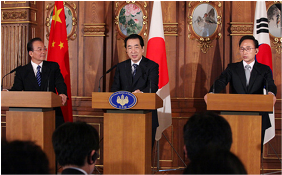|
JICC
Newsletter
No.4, June 2011 |
6. The
Fourth Japan-China-ROK Trilateral Summit Meeting Agrees to Promote
Wide-Ranging Trilateral Cooperation



Pictures: ©Cabinet Public Relations
Office
The Fourth Trilateral Summit Meeting of Japan, the People’s Republic
of China and the Republic of Korea (ROK) was held in Tokyo on May
22. The meeting was chaired by Prime Minister Naoto Kan and attended
by Chinese Premier Wen Jiabao and ROK President Lee Myung-bak, as
well as by Foreign Minister Takeaki Matsumoto and Minister of
Economy, Trade, and Industry Banri Kaieda of Japan.
The summit culminated in the Summit Declaration, including three
annexes: (1) Cooperation on Nuclear Safety; (2) Cooperation towards
Sustainable Growth through Promotion of Renewable Energy and
Energy-Efficiency; and (3) Cooperation on Disaster Management,
whereby the leaders of the three countries affirmed their commitment
to promoting trilateral cooperation in a wide range of fields.
(1) Cooperation on Nuclear Safety
In the aspect of nuclear safety, Japan, China and ROK (“the three
countries”) agreed to promote discussions among experts on
strengthening the safety of nuclear power generation. They also
shared the view that it is important to take necessary responses
prudently on the safety of products based upon scientific evidence
in case of a nuclear accident.
Prime Minister Kan stated that he will share the experience and
knowledge gained from TEPCO’s Fukushima Dai-ichi nuclear accident
with the international community under maximum transparency. He also
expressed his intention to promote trilateral cooperation through
such means as information sharing towards the improvement of the
safety of nuclear power generation.
(2) Cooperation towards Sustainable Growth through Promotion of
Renewable Energy and Energy-Efficiency
The three countries confirmed the necessity to commence research and
consultations in the area of sustainable growth that includes
renewable energy and energy-efficiency.
(3) Cooperation on Disaster Management
Prime Minister Kan stated that, drawing on the experience and
lessons learned from the Great East Japan Earthquake, he wants to
strengthen trilateral cooperation in disaster management. He
identified four specific areas of cooperation: (a) conducting
exercises and enhancing capacity; (b) ensuring quick and smooth
communications at the time of a disaster; (c) enhancing coordination
in providing and receiving disaster relief teams and assistance; and
(d) promoting technology and strengthening information sharing on
disaster management. The leaders of China and ROK concurred on the
importance of trilateral cooperation in disaster management. The
leaders of the three countries thus agreed to promote such
trilateral cooperation.
(4) Economic Growth, and People-to-People and Cultural Exchanges
The three countries agreed to accelerate the Joint Study on a
trilateral Free Trade Agreement and work to achieve a substantial
agreement on the Trilateral Investment Agreement as early as
possible. They also confirmed that promoting tourism among the three
countries is conducive to stimulating the economy, especially the
disaster-affected Japanese tourism sector. In addition, the three
countries supported the target of expanding the scale of
people-to-people exchanges among the three countries to 26 million
by 2015 and recognized that people-to-people and cultural exchanges
help enhance mutual trust and cooperative relationships among the
three countries. Prime Minister Kan asked the leaders of China and
ROK to encourage their countries’ tourists to visit Japan and said
that he would work to expand the scale of such people-to-people
exchanges in light of the importance of deepening the bonds of
friendship among the three peoples.
(5) Northeast Asian Situation
The three countries agreed to work together to elicit concrete
action from North Korea towards solving the outstanding issues in
accordance with the 2005 Joint Statement of the Six-Party Talks.
Prime Minister Kan expressed concern about North Korea’s uranium
enrichment program, stating that it constitutes a clear violation of
the 2005 Joint Statement as well as the relevant United Nations
Security Council resolutions. He also commended the diplomatic
efforts by China as the chair of the Six-Party Talks. Prime Minister
Kan stated that North Korea must, upon atoning for the two
provocative acts it committed last year and showing a positive
attitude towards denuclearization, demonstrate the commitments it
made at the Six-Party Talks with concrete action. He also requested
further cooperation from China and ROK towards solving the abduction
issue.
|
